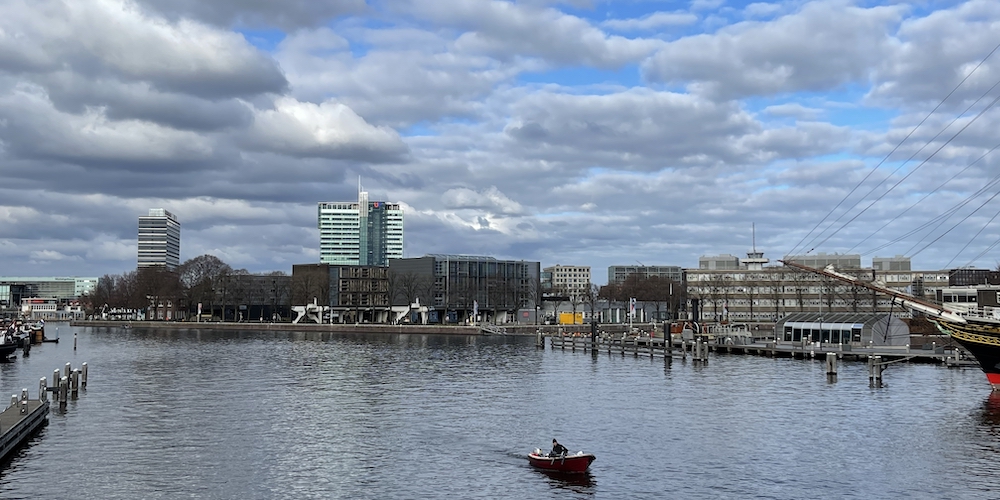Data about water quality, numbers of visitors, noise and biodiversity in the roof gardens: dozens of sensors collect loads of interesting data at Marineterrein. That is why three companies and AMdEX are working on a usecase at this remarkable Amsterdam district, that will make such data accessible to anyone*.
*) Conditions apply
Marineterrein is a living laboratory, where companies can test innovations. Tapp and Life Electronic have been working with Marineterrein on smart city solutions for years. For example, at the various entrances to the eight-hectare site, you will find signs showing visitors how busy it is in the various places. The information comes from four cameras that operate as sensors and can count how many people there are. Of course everything complies with the strictest privacy rules.
Social distancing
Another example is the LED lighting at the Marineterrein fitness garden. “If people are working within 1.5 meters of each other, that light will turn red to remind them to keep a safe distance from each other. Marineterrein also monitors the quality of the bathing water, for example,” says Tom van Arman of Tapp, who devised the LED lighting and other smart city solutions.
The data collected at Marineterrein is not only of interest to the users of the site and the parties who test their innovations there. Researchers, journalists and artists could also use the data for their research, stories and artworks. And that’s exactly where the link with AMdEX arose.
Prize winning Madaster
AMdEX partners are developing a digital notary so that the conditions under which data may be shared can be digitally recorded and enforced. This would enable more organizations to share data and (by doing so) take power away from the big tech giants. Dexes develops the platform for this open, fair and reliable data market. Two years ago, the company won an investment competition with Madaster, organised by Amsterdam Economic Board.
(Article continues below)
“AMdEX’ basic principle is: a data owner maintains possession and sets conditions for the data usage”
Setting conditions
“We want to automate the process for reliable data exchange as much as possible,” explains Joep Meindertsma of Dexes. “The owner of the data sets certain conditions. For example, they want money for it, or they set certain requirements for how or for how long the data may be used. The person who wants to use the data signs a digital contract for approval and then the data can be retrieved from the source. The basic principle is that the owner of the data also retains possession of the data and determines under which conditions others may use the data.”
Happy Flow
Back to Marineterrein, where work is now underway on the very first use case of AMdEX. “To be able to connect to the data exchange, we need to have our data infrastructure in order,” says Markus Pfundstein of Life Electronic. His company is responsible for the technology behind many of the smart city solutions at Marineterrein. “We must clean up all data and offer it automatically when approval is given for a transaction on AMdEX.”
Meindertsma, Van Arman and Pfundstein formulated an ideal customer journey, which they call the Happy Flow. If a request is made on AMdEX for a specific dataset, Marineterrein’s data infrastructure will receive a notification. The system checks the request, collects all data points from that database and makes a so-called sub package of it. The requester will then receive a link to download the data.
The development of this usecase has already provided Meindertsma with a lot of information. “For example about the API that our platform uses to communicate with the data infrastructure behind Marineterrein.” Dexes has now designed the API in a way that developers and data managers can easily use it. “That is extra important because in the smart city movement we often deal with volunteers,” explains Pfundstein. “If you want to use their data, you have to make the integration as easy as possible and ensure good documentation. They don’t want to spend four days integrating with AMdEX, but focus on their idea.”
In actual practice
A first version of AMdEX for the Marineterrein data should be ready in a few months. Then it can be tested in actual practice if and in what way others use the data. Van Arman: “Students and artists are already using the data and I am curious what will happen when it becomes even easier to obtain the data. I do believe in it, but I am biased: data is a design tool for me.”
Pfundstein thinks AMdEX has what it takes to revolutionize the data landscape. “Not everyone will share their data overnight: money, politics and egos will continue to play a role here. But AMdEX provides a good foundation: if the will is there, it’ll be much easier to share data.”
“We can show the world how a data exchange would work and what you can do with that data”
Van Arman is also hopeful: “Marineterrein is a testing ground for innovation and this usecase naturally suits the companies that are collecting data here. It allows us to test the concept behind AMdEX in practice. This model can then be copied worldwide. There will soon be a good infrastructure, providing data that is shareable, accessible and compliant with all regulations. And it won’t be owned by Google or Microsoft. It’ll be an important milestone: we can show the world how such a data exchange would work and what you can do with that data.”
Meindertsma: “With AMdEX we give people control over their own data. Tim Berners-Lee, the creator of the world wide web, envisioned a decentralized system, but in recent years we have seen more and more centralization. AMdEX would enable all to keep control of their own data, bringing us closer to that decentralized system.”
Text: Mirjam Streefkerk








